(8)什么是幸福
什么是幸福六年级满分作文

什么是幸福六年级满分作文(经典版)编制人:__________________审核人:__________________审批人:__________________编制单位:__________________编制时间:____年____月____日序言下载提示:该文档是本店铺精心编制而成的,希望大家下载后,能够帮助大家解决实际问题。
文档下载后可定制修改,请根据实际需要进行调整和使用,谢谢!并且,本店铺为大家提供各种类型的经典范文,如演讲稿、总结报告、合同协议、方案大全、工作计划、学习计划、条据书信、致辞讲话、教学资料、作文大全、其他范文等等,想了解不同范文格式和写法,敬请关注!Download tips: This document is carefully compiled by this editor.I hope that after you download it, it can help you solve practical problems. The document can be customized and modified after downloading, please adjust and use it according to actual needs, thank you!In addition, this shop provides you with various types of classic sample essays, such as speech drafts, summary reports, contract agreements, project plans, work plans, study plans, letter letters, speeches, teaching materials, essays, other sample essays, etc. Want to know the format and writing of different sample essays, so stay tuned!什么是幸福六年级满分作文或许,幸福只是吃得饱,有地方住,还有亲人的陪伴这样而已,但是,我们往往把它看得太复杂,总是以为它像高山的顶峰,很难达到,所以在追求幸福的过程中,以下是本店铺为大家整理的什么是幸福六年级满分作文,希望能给各位提供帮助,欢迎浏览阅读!什么是幸福六年级满分作文1什么是幸福?每个人对幸福这个词都不会感觉到很陌生,每个人对幸福也有不同的理解,每个人对幸福也有不同的想法和看法。
什么是幸福?

什么是幸福?当谈论幸福时,它是一个主观的概念,因为不同的人对幸福有不同的定义和体验。
然而,幸福可以被理解为一种持久的、内在的满足感和满足需求的状态。
下面是一个详细、准确、有条理和易于理解的回答:第一步:定义幸福幸福是指一个人在生活中感到满足、快乐和满足的状态。
它不仅仅是短暂的快乐,而是一种持久的心理状态。
第二步:幸福的组成部分幸福由多个因素组成,包括情感、心理和生理层面的满足。
情感上的幸福可以通过与他人建立良好的关系、拥有亲密的友谊和爱情关系来实现。
心理上的幸福可以通过自我实现、充实的工作和追求个人目标来实现。
生理上的幸福可以通过良好的健康状况、充足的睡眠和适度的运动来实现。
第三步:幸福的来源幸福的来源包括内在和外在的因素。
内在因素是指个人的态度、价值观和思维方式。
积极乐观的态度、感恩和接受现实可以增加幸福感。
外在因素是指外部环境和生活条件。
例如,稳定的收入、良好的社交支持和舒适的生活环境可以提高幸福感。
第四步:幸福的追求幸福是一个追求的过程,而不是一个终点。
人们可以通过培养积极的心态、发展个人兴趣爱好、与他人建立深入的连接和追求个人成长来增加幸福感。
此外,给予和奉献也可以带来幸福感,因为它可以增加对他人的关怀和社会责任感。
第五步:幸福的主观性幸福是一个主观的概念,因为每个人对幸福的定义和体验都不同。
每个人都有不同的价值观、目标和需求,因此他们对幸福的追求也不同。
因此,重要的是要尊重每个人对幸福的定义,并尽力满足自己和他人的幸福需求。
综上所述,幸福是一种持久的、内在的满足感和满足需求的状态。
它由情感、心理和生理因素组成,可以通过内在和外在的因素实现。
幸福是一个个体化的追求过程,并受到个人的态度、价值观和生活环境的影响。
最重要的是,幸福是一种主观的体验,每个人都有不同的定义和追求方式。
什么是幸福
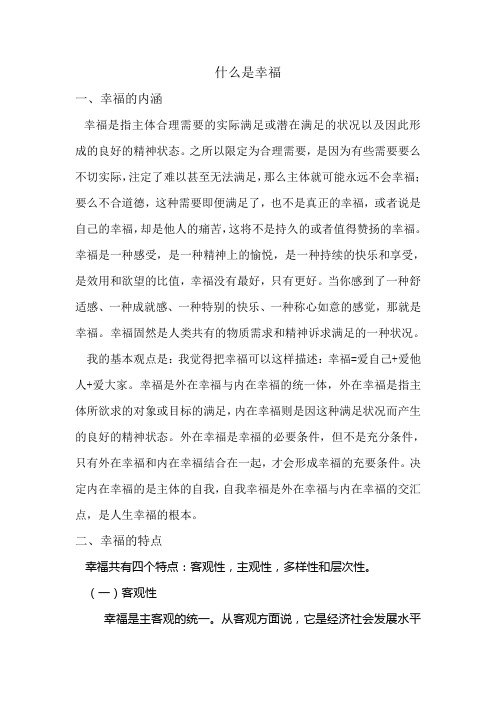
什么是幸福一、幸福的内涵幸福是指主体合理需要的实际满足或潜在满足的状况以及因此形成的良好的精神状态。
之所以限定为合理需要,是因为有些需要要么不切实际,注定了难以甚至无法满足,那么主体就可能永远不会幸福;要么不合道德,这种需要即便满足了,也不是真正的幸福,或者说是自己的幸福,却是他人的痛苦,这将不是持久的或者值得赞扬的幸福。
幸福是一种感受,是一种精神上的愉悦,是一种持续的快乐和享受,是效用和欲望的比值,幸福没有最好,只有更好。
当你感到了一种舒适感、一种成就感、一种特别的快乐、一种称心如意的感觉,那就是幸福。
幸福固然是人类共有的物质需求和精神诉求满足的一种状况。
我的基本观点是:我觉得把幸福可以这样描述:幸福=爱自己+爱他人+爱大家。
幸福是外在幸福与内在幸福的统一体,外在幸福是指主体所欲求的对象或目标的满足,内在幸福则是因这种满足状况而产生的良好的精神状态。
外在幸福是幸福的必要条件,但不是充分条件,只有外在幸福和内在幸福结合在一起,才会形成幸福的充要条件。
决定内在幸福的是主体的自我,自我幸福是外在幸福与内在幸福的交汇点,是人生幸福的根本。
二、幸福的特点幸福共有四个特点:客观性,主观性,多样性和层次性。
(一)客观性幸福是主客观的统一。
从客观方面说,它是经济社会发展水平的结果和反映,离不开一定的物质条件和社会环境。
当你不注意时候,旁边的一个人突然对你说:你脚下有一条蛇,你会突然被吓一大跳。
你自己当时瞬间也以为那是真的,也是主观想象,但是你被吓一跳的感觉却是真实存在的,是客观的。
(二)主观性从主观方面说,它是人们对外在世界的一种感受和体验,取决于自己的价值取向和精神状态。
幸福的主观性主要表现在:就其表层样态来说,幸福是极度快乐的心理体验,是一种感情,属于主观意识范畴。
因为幸福自身的样态是主观的,因而的确完全依自己的主观感觉而转移,即只要一个人觉得幸福,他确实就是幸福的;只要觉得不幸,他确实就是不幸的。
当你不注意时候,旁边的一个人突然对你说:你脚下有一条蛇,你会突然被吓一大跳。
幸福在现代汉语词典中的解释
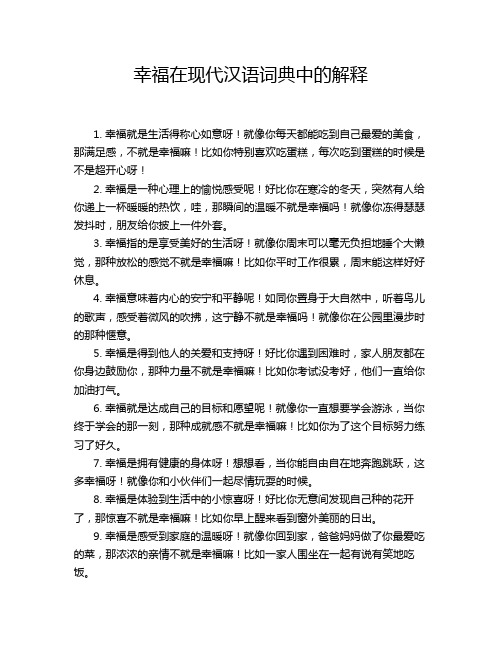
幸福在现代汉语词典中的解释1. 幸福就是生活得称心如意呀!就像你每天都能吃到自己最爱的美食,那满足感,不就是幸福嘛!比如你特别喜欢吃蛋糕,每次吃到蛋糕的时候是不是超开心呀!2. 幸福是一种心理上的愉悦感受呢!好比你在寒冷的冬天,突然有人给你递上一杯暖暖的热饮,哇,那瞬间的温暖不就是幸福吗!就像你冻得瑟瑟发抖时,朋友给你披上一件外套。
3. 幸福指的是享受美好的生活呀!就像你周末可以毫无负担地睡个大懒觉,那种放松的感觉不就是幸福嘛!比如你平时工作很累,周末能这样好好休息。
4. 幸福意味着内心的安宁和平静呢!如同你置身于大自然中,听着鸟儿的歌声,感受着微风的吹拂,这宁静不就是幸福吗!就像你在公园里漫步时的那种惬意。
5. 幸福是得到他人的关爱和支持呀!好比你遇到困难时,家人朋友都在你身边鼓励你,那种力量不就是幸福嘛!比如你考试没考好,他们一直给你加油打气。
6. 幸福就是达成自己的目标和愿望呢!就像你一直想要学会游泳,当你终于学会的那一刻,那种成就感不就是幸福嘛!比如你为了这个目标努力练习了好久。
7. 幸福是拥有健康的身体呀!想想看,当你能自由自在地奔跑跳跃,这多幸福呀!就像你和小伙伴们一起尽情玩耍的时候。
8. 幸福是体验到生活中的小惊喜呀!好比你无意间发现自己种的花开了,那惊喜不就是幸福嘛!比如你早上醒来看到窗外美丽的日出。
9. 幸福是感受到家庭的温暖呀!就像你回到家,爸爸妈妈做了你最爱吃的菜,那浓浓的亲情不就是幸福嘛!比如一家人围坐在一起有说有笑地吃饭。
10. 幸福是对生活充满希望呀!如同在黑暗中看到了一丝曙光,那种期待不就是幸福嘛!就像你对未来有着美好的憧憬。
我觉得呀,幸福其实很简单,就在我们生活的点点滴滴中,只要我们用心去感受,就能发现幸福无处不在!。
什么是幸福作文(精选15篇)

什么是幸福作文什么是幸福作文(精选15篇)在日常学习、工作或生活中,大家最不陌生的就是作文了吧,根据写作命题的特点,作文可以分为命题作文和非命题作文。
你所见过的作文是什么样的呢?以下是小编为大家收集的什么是幸福作文,希望对大家有所帮助。
什么是幸福作文1出差归来,车自由的奔驰在马路上,过了都江堰的界线州内明显山川亮堂多了。
深秋的景色也是那么耀眼、那么绚烂、那么美丽。
小鱼哥在路上,车开的很平稳,路途中、时不时要水喝,魏姐也是一一满足,倒水、喂水、动作是那么熟练那么自如,那么娴熟。
在喂苹果时果果很脆,冒出的声音也是那么响亮,整车里都沉浸在吃苹果的声响里,这声响是幸福的旋律。
那么悦耳、那么动听、那么悠扬、那么简单、简单的很幸福、幸福的很简单、另人效仿、让人向往、让人羡慕。
魏姐象小鸟依人一样依偎在他的身旁为他做一切。
总是那么娴熟、那么温柔、让人感觉是那么的幸福、那么的和谐、值得我用一生去效仿学习和跟随......魏姐为小鱼哥拿着喝剩的水,吃了一半的果。
这气氛让旁人看见显得是那么温馨幸福和谐。
好让人羡慕。
也许幸福就应该是那么简单、那样幸福......相互感恩和互相感激为对方付出一切、对双方的深情付出。
有这样的幸福一生足已、有你们真好!若你们安好便是我用一生永远幸福相伴的效仿和跟随。
车行驶到大半路时天空出现了晚霞。
大家都惊喜着,忙着向窗外望去,望着窗外路是幸福的、天空也是幸福的、树木也是幸福的、大地也是幸福的、就连晚霞也是幸福的、我的心里、和我每一处的看见都是幸福的。
至此我眼里的万事万物都是幸福的、其实幸福很简单、简单很幸福。
我们的车迎接着夕阳的余晖......大地也变的光鲜亮丽,路也变的不在遥远,回家的脚步变得轻盈。
夕阳的余晖迎接回家的步伐,越来越近。
向着幸福的方向出发。
什么是幸福作文2很多人说幸福是什么,幸福是一缕阳光,照耀你的光芒;幸福是一种爱意,有家人也有爱人;幸福是一根甚至更多的棒棒糖,甜甜的。
在学校,在家里,在外面都能感受到幸福。
什么是幸福搞笑演讲
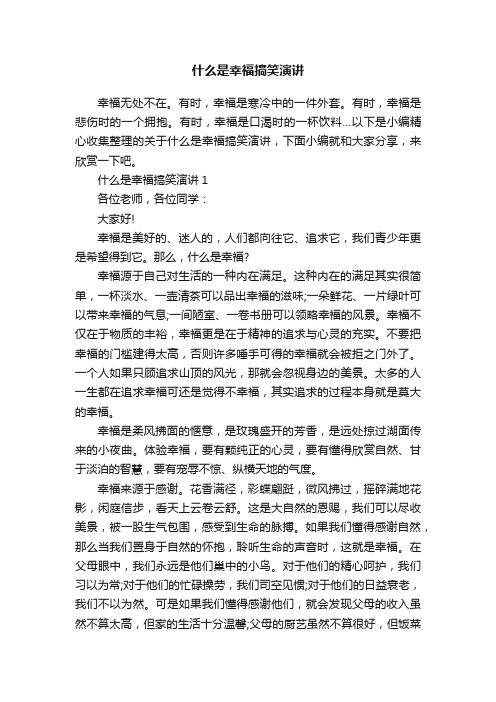
什么是幸福搞笑演讲幸福无处不在。
有时,幸福是寒冷中的一件外套。
有时,幸福是悲伤时的一个拥抱。
有时,幸福是口渴时的一杯饮料…以下是小编精心收集整理的关于什么是幸福搞笑演讲,下面小编就和大家分享,来欣赏一下吧。
什么是幸福搞笑演讲1各位老师,各位同学:大家好!幸福是美好的、迷人的,人们都向往它、追求它,我们青少年更是希望得到它。
那么,什么是幸福?幸福源于自己对生活的一种内在满足。
这种内在的满足其实很简单,一杯淡水、一壶清茶可以品出幸福的滋味;一朵鲜花、一片绿叶可以带来幸福的气息;一间陋室、一卷书册可以领略幸福的风景。
幸福不仅在于物质的丰裕,幸福更是在于精神的追求与心灵的充实。
不要把幸福的门槛建得太高,否则许多唾手可得的幸福就会被拒之门外了。
一个人如果只顾追求山顶的风光,那就会忽视身边的美景。
太多的人一生都在追求幸福可还是觉得不幸福,其实追求的过程本身就是莫大的幸福。
幸福是柔风拂面的惬意,是玫瑰盛开的芳香,是远处掠过湖面传来的小夜曲。
体验幸福,要有颗纯正的心灵,要有懂得欣赏自然、甘于淡泊的智慧,要有宠辱不惊、纵横天地的气度。
幸福来源于感谢。
花香满径,彩蝶翩跹,微风拂过,摇碎满地花影,闲庭信步,看天上云卷云舒。
这是大自然的恩赐,我们可以尽收美景,被一股生气包围,感受到生命的脉搏。
如果我们懂得感谢自然,那么当我们置身于自然的怀抱,聆听生命的声音时,这就是幸福。
在父母眼中,我们永远是他们巢中的小鸟。
对于他们的精心呵护,我们习以为常;对于他们的忙碌操劳,我们司空见惯;对于他们的日益衰老,我们不以为然。
可是如果我们懂得感谢他们,就会发现父母的收入虽然不算太高,但家的生活十分温馨;父母的厨艺虽然不算很好,但饭菜做得十分可口;父母的穿着虽然不算入时,但我们却穿得十分得体……这些发现让我们感到,其实我们早就被幸福融化了。
幸福的秘诀是宽容。
宽广的心胸,不为小事皱眉,时时保持一颗健康、积极的心,青春的脸上洋溢着洒脱的笑容,这样不仅可以幸福自己也可以幸福他人。
幸福是什么意思

幸福是什么意思
什么是幸福?大概一万个人会有一万种答案,这是一个几乎无解又处处是答案的问题,幸福更多的是一种主观感受。
幸福是一种自我需求得到满足以后的喜悦并希望一直保持现状的心理状态。
首先幸福是一种心理上的感觉,就像炎炎夏日你有一杯冷饮,或者冰天雪地里你有一杯热茶时,你的需要得到满足后的那种喜悦就是幸福。
幸福是一种体会,幸福是生活平顺,家人健康,事业有成,孩子上进的一种自我体验。
父母亲人身体健康,孩子上进勤奋,工作顺心,经济富裕,这是很多人都想要的幸福。
幸福是顺其自然,知足常乐,心态良好,积极向上的一种状态。
都说知足者常乐,这句话是很有道理的,很多人的幸福都是建立在和别人的对比中而产生的心理上的优越感。
幸福是什么的话题答案很多,但归根结底,幸福是一种感觉,一种体会,更是一种知足常乐的心境。
什么是幸福句子感悟

什么是幸福句子感悟幸福是人们一直追求的目标,它是生活中最美好的事物之一。
每个人对幸福的理解和感悟都有所不同,下面是我对幸福的几点感悟。
1. 幸福是一种内心的感受,它不仅仅取决于外界的物质条件,更取决于我们对生活的态度和心态。
当我们学会感恩,积极面对生活中的困难和挑战,才能真正体会到幸福的滋味。
2. 幸福是一种情感的交流和分享。
当我们与家人、朋友、爱人之间建立起深厚的情感纽带,能够相互理解和支持,分享彼此的喜怒哀乐,这种亲密关系会给我们带来无尽的幸福。
3. 幸福是一种自我实现和成长的过程。
当我们能够不断地追求自己的梦想,不断提升自己的能力和素质,实现自己的价值和目标时,内心会充满满足感和成就感,从而感受到幸福的存在。
4. 幸福是一种对生活中美好事物的感知和欣赏。
当我们学会用心去感受大自然的美丽、欣赏艺术作品的精妙和品味美食的美味时,我们会感到一种无尽的幸福和满足感。
5. 幸福是一种内心的宁静和平和。
当我们能够保持内心的平和和宁静,不为外界的浮躁和压力所困扰,学会调节自己的情绪和心态,我们会感受到一种无比的幸福和安定。
6. 幸福是一种奉献和帮助他人的乐趣。
当我们能够主动关心和帮助他人,为他人带来快乐和帮助时,我们会感到一种无比的幸福和满足感,同时也收获到他人的感激和喜爱。
7. 幸福是一种追求和坚持。
当我们有自己的目标和梦想,并为之努力奋斗时,即使过程中会有困难和挫折,但当我们最终实现了自己的梦想时,会感受到一种前所未有的幸福和满足。
8. 幸福是一种对生命的珍惜和感激。
当我们能够珍惜每一天、感激生活中的点滴幸福和美好时刻,我们会发现幸福其实就在我们身边,只需要用心去感受和体会。
9. 幸福是一种对自己的接纳和爱护。
当我们能够接纳自己的缺点和不足,学会爱护自己,关注自己的身心健康和内心需求时,我们会感受到一种无比的幸福和满足。
10. 幸福是一种对未来的期许和希望。
当我们对未来充满信心,相信自己的努力和付出一定会有回报时,我们会感受到一种无尽的幸福和希望,激发我们不断向前的动力。
什么是幸福?我们如何追求幸福?
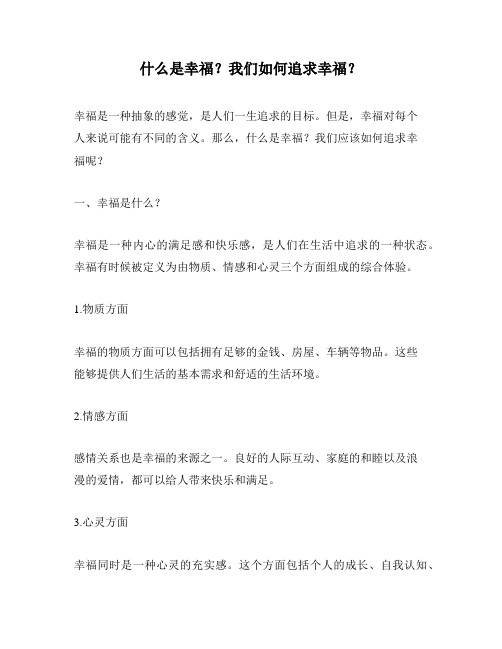
什么是幸福?我们如何追求幸福?幸福是一种抽象的感觉,是人们一生追求的目标。
但是,幸福对每个人来说可能有不同的含义。
那么,什么是幸福?我们应该如何追求幸福呢?一、幸福是什么?幸福是一种内心的满足感和快乐感,是人们在生活中追求的一种状态。
幸福有时候被定义为由物质、情感和心灵三个方面组成的综合体验。
1.物质方面幸福的物质方面可以包括拥有足够的金钱、房屋、车辆等物品。
这些能够提供人们生活的基本需求和舒适的生活环境。
2.情感方面感情关系也是幸福的来源之一。
良好的人际互动、家庭的和睦以及浪漫的爱情,都可以给人带来快乐和满足。
3.心灵方面幸福同时是一种心灵的充实感。
这个方面包括个人的成长、自我认知、探索和满足生活的目的。
二、幸福是如何追求的?无论我们现在处于什么状态,追求幸福是每个人的天然本能。
但是,怎样才能在生活中实现这个目标呢?1.调整心态有一个积极的心态非常重要。
开展积极的思想活动和自我肯定,可以帮助我们更加容易地感受到幸福--包括我们拥有的东西,人际关系和我们自己。
2.实现生活目标幸福的感觉与成就感密切相关。
可以制定一些有意义的目标,让自己朝着目标不断努力。
即使面临挑战和失败,如果能够坚持自己的努力,也许这些过程也会带来快乐和成就感。
3.倾听内心需要倾听自己的心声,找到适合自己的生活方式很重要。
不要为了迎合他人或者为了金钱而放弃追求真正意味着幸福的东西。
让自己快乐地生活是最重要的。
4.建立友谊关系与身边的人建立深厚的友谊关系也可以带来快乐。
这些人会在你需要他们的时候给你帮助和支持。
5.丰富生活有趣和多元化的活动,像旅行、文化活动、音乐和艺术类活动,可以让你在生活中发现新的感受和增加幸福指数。
结论:当你真正做到了内心的认可和平衡,生活中你将会更容易感受到幸福。
当你深入关爱你自己,也会让自己接受身边所有的美好感受--无论是关系,工作还是时间。
追求幸福的道路并不容易,但是,如果你能够认识到追求幸福的意义并每天努力去实现,你也许会找到一种更加意义深远、更加长久的生活态度。
什么叫幸福6篇
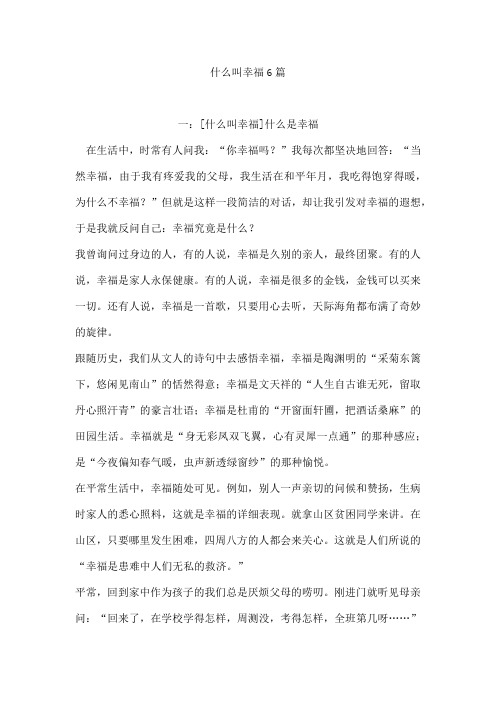
什么叫幸福6篇一:[什么叫幸福]什么是幸福在生活中,时常有人问我:“你幸福吗?”我每次都坚决地回答:“当然幸福,由于我有疼爱我的父母,我生活在和平年月,我吃得饱穿得暖,为什么不幸福?”但就是这样一段简洁的对话,却让我引发对幸福的遐想,于是我就反问自己:幸福究竟是什么?我曾询问过身边的人,有的人说,幸福是久别的亲人,最终团聚。
有的人说,幸福是家人永保健康。
有的人说,幸福是很多的金钱,金钱可以买来一切。
还有人说,幸福是一首歌,只要用心去听,天际海角都布满了奇妙的旋律。
跟随历史,我们从文人的诗句中去感悟幸福,幸福是陶渊明的“采菊东篱下,悠闲见南山”的恬然得意;幸福是文天祥的“人生自古谁无死,留取丹心照汗青”的豪言壮语;幸福是杜甫的“开窗面轩圃,把酒话桑麻”的田园生活。
幸福就是“身无彩凤双飞翼,心有灵犀一点通”的那种感应;是“今夜偏知春气暖,虫声新透绿窗纱”的那种愉悦。
在平常生活中,幸福随处可见。
例如,别人一声亲切的问候和赞扬,生病时家人的悉心照料,这就是幸福的详细表现。
就拿山区贫困同学来讲。
在山区,只要哪里发生困难,四周八方的人都会来关心。
这就是人们所说的“幸福是患难中人们无私的救济。
”平常,回到家中作为孩子的我们总是厌烦父母的唠叨。
刚进门就听见母亲问:“回来了,在学校学得怎样,周测没,考得怎样,全班第几呀……”临走时总是说:“把该拿的东西拿上,钱够不够?不够再拿点。
上课肯定要仔细听老师讲。
”殊不知,这就是幸福。
在我的心里,幸福,其实很简洁,只要专心去体会,就肯定能发觉幸福的踪迹。
二:[什么叫幸福]什么是幸福我们身处在繁华喧嚣的世界,追赶所谓的功名利禄,坚持本不该坚持的泡沫幻想。
遗忘了人们最宝贵的,最渴望的,最漂亮的幸福。
是否曾想探求过幸福,幸福是什么?幸福是家人悄悄无闻的的真情守护。
人谁无过?因此需要有人在你我身边督促改过,帮扶我们不断完善自己。
家人是一台永不言败的充气机,也是我们遭受困难的求败者,更是我们受伤时的避风港。
幸福的定义
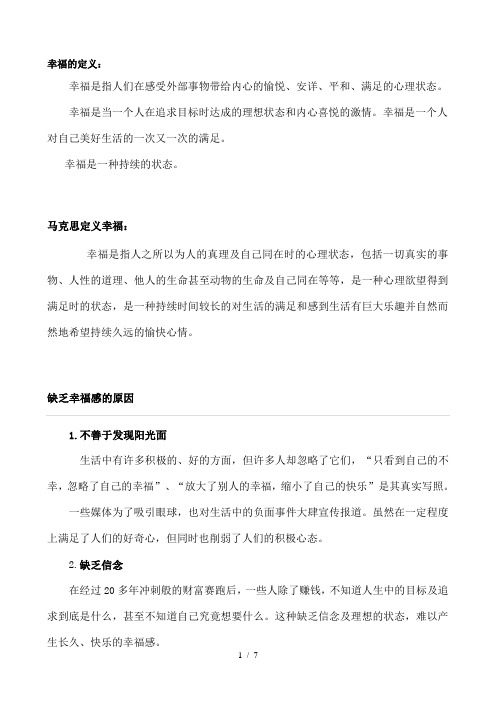
幸福的定义:幸福是指人们在感受外部事物带给内心的愉悦、安详、平和、满足的心理状态。
幸福是当一个人在追求目标时达成的理想状态和内心喜悦的激情。
幸福是一个人对自己美好生活的一次又一次的满足。
幸福是一种持续的状态。
马克思定义幸福:幸福是指人之所以为人的真理及自己同在时的心理状态,包括一切真实的事物、人性的道理、他人的生命甚至动物的生命及自己同在等等,是一种心理欲望得到满足时的状态,是一种持续时间较长的对生活的满足和感到生活有巨大乐趣并自然而然地希望持续久远的愉快心情。
缺乏幸福感的原因1.不善于发现阳光面生活中有许多积极的、好的方面,但许多人却忽略了它们,“只看到自己的不幸,忽略了自己的幸福”、“放大了别人的幸福,缩小了自己的快乐”是其真实写照。
一些媒体为了吸引眼球,也对生活中的负面事件大肆宣传报道。
虽然在一定程度上满足了人们的好奇心,但同时也削弱了人们的积极心态。
2.缺乏信念在经过20多年冲刺般的财富赛跑后,一些人除了赚钱,不知道人生中的目标及追求到底是什么,甚至不知道自己究竟想要什么。
这种缺乏信念及理想的状态,难以产生长久、快乐的幸福感。
3.老爱比较现代人把主要精力都投入到竞争中,比职位、比房子、比财富……比来比去,人们的心里只剩下欲望,没有了幸福。
一旦人追求的不是如何幸福,而是怎么比别人幸福时,幸福也就离你远去了。
[1]4.不知道奉献美国哈佛大学一项研究曾显示,在生活中多去帮助他人,能让自己感到更快乐。
但现代社会中,乐于无私奉献的人越来越少,斤斤计较的人越来越多。
如果你总算计着“我能从中得到什么”、“做这件事值不值得”,就会生活的很。
5.不知足俗话说“知足者常乐”,但能知足的人越来越少了,有了房子想换更大的,有了工作想换更好的,有了钱想赚得更多……这些欲望,指使着人无休止地奔波劳碌,硬撑着去争取登上那“辉煌”的顶峰。
6.相互不信任社会虽然通讯高度发达,但人们的心灵却渐渐疏远了。
现在的人越来越倾向于“右脑”思维模式,而右脑掌管个体、权力、地位等,对于幸福的感受度是0。
什么是幸福议论文(通用20篇)

什么是幸福议论文什么是幸福议论文(通用20篇)相信大家都经常接触到作文吧,尤其作为作文里的重要分类的议论文,议论文是一种剖析事物、论述事理、发表意见、提出主张的文体。
写这类作文需要注意哪些事项呢?以下是小编为大家整理的什么是幸福议论文,欢迎阅读,希望大家能够喜欢。
什么是幸福议论文篇1什么是幸福?不同的人有不同的理解。
我觉得,幸福就是一种心理感觉。
幸福指数与物质条件、社会环境有关,更与心理需求有关。
现在把物质条件、社会环境概括为生存状况,若用一个公式来表示幸福指数和生存状况、心理需求之间的关系,那么就是这样:幸福指数=生存状况/心理需求。
幸福指数与生存状况成正比,与心理需求成反比。
同等的心理需求,生存状况越好,幸福指数就越高。
相反,同样的生存状况,心理需求越大,幸福指数反而越低。
有的人身价亿万,位高权重,生存状况不能说不优越,可其中还是有不少人感觉并非很幸福。
这是因为他们有许多烦恼或太多太高的欲望。
有的小人物,默默无闻,囊中无多,可生活过得有滋有味。
这是因为他们对生活的预期很低。
有的人只要有一个稳定的家庭,一份不错的工作,生活平平安安,他们就会沾沾自喜。
他们的期待很容易满足。
有的人对金钱、对地位、对名誉、对感情,得陇望蜀,无休无止。
越到后来欲望越高,越不可轻易达到,哪来的幸福感觉?我们应该根据实际恰当设定自己的心理预期。
我们要随时调整自己的心理需求,让自己幸福起来。
俄国大文豪托尔斯泰有一句名言:幸福的家庭是相似的,而不幸的家庭则各有各的不幸。
依我看,幸福的家庭也是各有各的幸福。
有的幸福家庭差异就有本质的不同。
有些人因事业成功、生活条件优越而幸福,有的却是因为安贫乐道、家庭成员相濡以沫而幸福。
正因为幸福也是不同的,所以幸福是不可以拿来和别人比的,只能清点自己的幸福。
优越的物质条件不能召之即来,而自己的心理预期则随时可以改变。
大人物有大人物的幸福,小人物有小人物的幸福。
愿我们人人都把握住自己的心态,成为一个幸福快乐的人。
什么是幸福作文15篇(精华版)
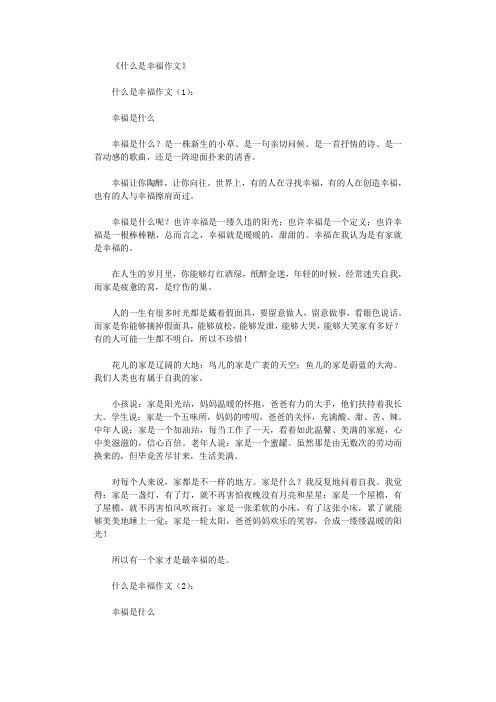
《什么是幸福作文》什么是幸福作文(1):幸福是什么幸福是什么?是一株新生的小草、是一句亲切问候、是一首抒情的诗、是一首动感的歌曲,还是一阵迎面扑来的清香。
幸福让你陶醉,让你向往。
世界上,有的人在寻找幸福,有的人在创造幸福,也有的人与幸福擦肩而过。
幸福是什么呢?也许幸福是一缕久违的阳光;也许幸福是一个定义;也许幸福是一根棒棒糖,总而言之,幸福就是暖暖的,甜甜的。
幸福在我认为是有家就是幸福的。
在人生的岁月里,你能够灯红酒绿,纸醉金迷,年轻的时候,经常迷失自我,而家是疲惫的窝,是疗伤的巢。
人的一生有很多时光都是戴着假面具,要留意做人,留意做事,看眼色说话。
而家是你能够摘掉假面具,能够放松,能够发泄,能够大哭,能够大笑家有多好?有的人可能一生都不明白,所以不珍惜!花儿的家是辽阔的大地;鸟儿的家是广袤的天空;鱼儿的家是蔚蓝的大海。
我们人类也有属于自我的家。
小孩说:家是阳光站,妈妈温暖的怀抱,爸爸有力的大手,他们扶持着我长大。
学生说:家是一个五味所,妈妈的唠叨,爸爸的关怀,充满酸、甜、苦、辣。
中年人说:家是一个加油站,每当工作了一天,看着如此温馨、美满的家庭,心中美滋滋的,信心百倍。
老年人说:家是一个蜜罐。
虽然那是由无数次的劳动而换来的,但毕竟苦尽甘来,生活美满。
对每个人来说,家都是不一样的地方。
家是什么?我反复地问着自我。
我觉得:家是一盏灯,有了灯,就不再害怕夜晚没有月亮和星星;家是一个屋檐,有了屋檐,就不再害怕风吹雨打;家是一张柔软的小床,有了这张小床,累了就能够美美地睡上一觉;家是一轮太阳,爸爸妈妈欢乐的笑容,合成一缕缕温暖的阳光!所以有一个家才是最幸福的是。
什么是幸福作文(2):幸福是什么幸福是什么?有人说,幸福是天上温暖的太阳;有人说,幸福是父母的一个关切的眼神在我看来,幸福,就象一串小小的开心棒棒糖一样,虽然简单,但充满了甜蜜红色,象征着温暖;绿色,象征着生机莹然;黄色,象征着富有、温柔;蓝色,就是大海,自我的心胸象大海一样宽广。
幸福是什么意思
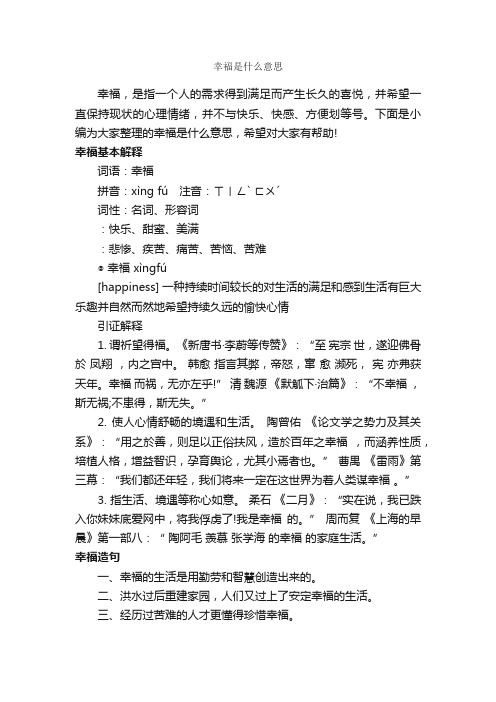
幸福是什么意思幸福,是指一个人的需求得到满足而产生长久的喜悦,并希望一直保持现状的心理情绪,并不与快乐、快感、方便划等号。
下面是小编为大家整理的幸福是什么意思,希望对大家有帮助!幸福基本解释词语:幸福拼音:xìng fú注音:ㄒㄧㄥˋ ㄈㄨˊ词性:名词、形容词:快乐、甜蜜、美满:悲惨、疾苦、痛苦、苦恼、苦难◎ 幸福xìngfú[happiness] 一种持续时间较长的对生活的满足和感到生活有巨大乐趣并自然而然地希望持续久远的愉快心情引证解释1. 谓祈望得福。
《新唐书·李蔚等传赞》:“至宪宗世,遂迎佛骨於凤翔,内之宫中。
韩愈指言其弊,帝怒,窜愈濒死,宪亦弗获天年。
幸福而祸,无亦左乎!” 清魏源《默觚下·治篇》:“不幸福,斯无祸;不患得,斯无失。
”2. 使人心情舒畅的境遇和生活。
陶曾佑《论文学之势力及其关系》:“用之於善,则足以正俗扶风,造於百年之幸福,而涵养性质,培植人格,增益智识,孕育舆论,尤其小焉者也。
” 曹禺《雷雨》第三幕:“我们都还年轻,我们将来一定在这世界为着人类谋幸福。
”3. 指生活、境遇等称心如意。
柔石《二月》:“实在说,我已跌入你妹妹底爱网中,将我俘虏了!我是幸福的。
” 周而复《上海的早晨》第一部八:“ 陶阿毛羡慕张学海的幸福的家庭生活。
”幸福造句一、幸福的生活是用勤劳和智慧创造出来的。
二、洪水过后重建家园,人们又过上了安定幸福的生活。
三、经历过苦难的人才更懂得珍惜幸福。
四、生活的浪花给我们带来快乐和幸福。
五、我们祝愿爷爷健康长寿,晚年幸福。
六、我们的儿童时代是在幸福中度过的。
七、得到妈妈的爱抚是多么幸福啊!八、善心常在,恶念无存,幸福就会永远伴随着自己。
九、李叔叔的家庭生活很幸福,他有一个温柔的妻子和一个聪明的女儿。
十、一家人老少三代,过着幸福美满的生活。
十一、同学们写诗,赞美我们的幸福生活。
十二、奶奶的脸上常常显露出幸福的笑容。
什么是幸福

什么是幸福,如何达到幸福幸福是人们始终追求的状态之一。
人们希望能够拥有一种快乐、满足和有意义的生活,这种生活能够让他们感到幸福。
然而,幸福这个概念对于每个人来说都有不同的含义,因为每个人对于幸福的理解和追求都是不同的。
本文将从多个角度来探讨幸福的含义,以及如何达到幸福。
一、幸福的含义(一)主观幸福感主观幸福感是指个体对自己所处状态的感受和评价。
即个体对于自己的生活感到满意、快乐、有意义等的体验和感受。
不同的人对于主观幸福感的评价标准会有所不同,因为每个人对于幸福的理解和追求都是不同的。
(二)客观幸福指标客观幸福指标是指通过具体的生活条件和环境来评价一个人的幸福程度。
比如:收入、教育程度、健康状况等。
这些指标能够反映出一个人在经济、社会、文化等方面的生活状况,从而评价一个人的幸福程度。
(三)心理学的幸福感心理学的幸福感是指个体对于自身生活满意度的心理感受。
它包括了个体的情感、认知、行为等多个方面。
这种幸福感是一种主观感受,与客观条件无关。
心理学的幸福感是人们对于自身生活状态的认知和评价,它能够反映出一个人的幸福程度。
二、如何达到幸福(一)建立积极的人生态度幸福与人的态度有很大的关系。
积极的人生态度能够帮助人们更好地应对生活中的困难和挑战,从而让生活更加美好。
建立积极的人生态度,可以从以下几个方面入手:1. 接受自己,了解自己的优点和缺点。
2. 学会感恩,珍惜身边的人和事。
3. 保持平衡,不要过分追求某些东西。
4. 坚持信念,保持自己的信仰和价值观。
(二)与他人建立良好的关系与他人建立良好的关系是幸福的重要保障。
良好的人际关系能够让人们感受到温暖和关爱,从而让生活更加美好。
建立良好的人际关系,可以从以下几个方面入手:1. 关心他人,尊重他人。
2. 倾听他人,理解他人。
3. 给予他人支持和帮助。
4. 学会原谅和包容他人。
(三)保持身体健康身体健康是幸福的重要保障。
只有身体健康,才能够享受生活的美好和快乐。
什么是幸福作文800字2篇

什么是幸福作文800字2篇在学习、工作、生活中,大家都不可避免地会接触到作文吧,作文是人们以书面形式表情达意的言语活动。
你知道作文怎样才能写的好吗?下面是小编为大家收集的什么是幸福作文800字2篇,仅供参考,大家一起来看看吧。
什么是幸福作文800字2篇1在这个世界上,什么是最重要的呢?有人说,幸福就是你没有资格,没有权力;有人说,幸福就是你没有资格,没有爱好;有人说,幸福就是你没有资格。
幸福,就是你没有资格,没有权力,没有权力,没有金钱,没有权力,没有权利。
幸福,就是你没有权利,没有权限,没有金钱,没权权私利,没有私利,没有私利和不安,没有权益,没有权权私的,没有,幸福,就是你的心,你不想幸福吗?幸福就是你在别人眼中,是什么?就是不要自己的幸福,别人对你说:“你有资格,你有权利吗?”这句话,我想你听了都会笑,但是有一天,我却改变了这种看法一个炎热的夏天,我在家里看电视,电扇开着了,我就去看电视了。
我看着看着我的手一阵疼,妈妈就说:“宝贝,你手怎么了?是不是不舒服啊?”我说:“是呀,我不舒服。
”我妈妈说:“你怎么了?”我说:“我不舒服,我不舒服。
”我妈妈一边说,一边说:“我要不你陪我去医院看看?”我说:“没有啊!”我就去医院了。
过了一会儿,医生就把我的手给拔下来了,我说:“妈妈,你的身体好不好?”妈妈说:“没事,只要你好了。
”妈妈说:“那你去吧,我去给你买药去。
”我就去给妈妈买药去了。
过了一会儿,妈妈来到了我的家门口,我就对妈妈说:“我的妈妈,我的身体不好!”妈妈说:“你的身体怎么这么差,是不是有点不舒服。
”妈妈说:“你不舒服,你不是有点不舒服,是不是有点不舒服了?”我说:“是呀,妈妈你的身体好不好!”妈妈说:“那我就去给你买,好不好?”我就给妈妈买了,我就给妈妈买了下来,我就对妈妈说:“妈妈,您休息一下,我去给你买了。
”妈妈说:“不行!”我就给妈妈买了下来,我就给妈妈买了下来,我就给妈妈买了下来,我就给妈妈说:“妈妈,您辛苦了。
有关幸福是什么的句子(精选70句)
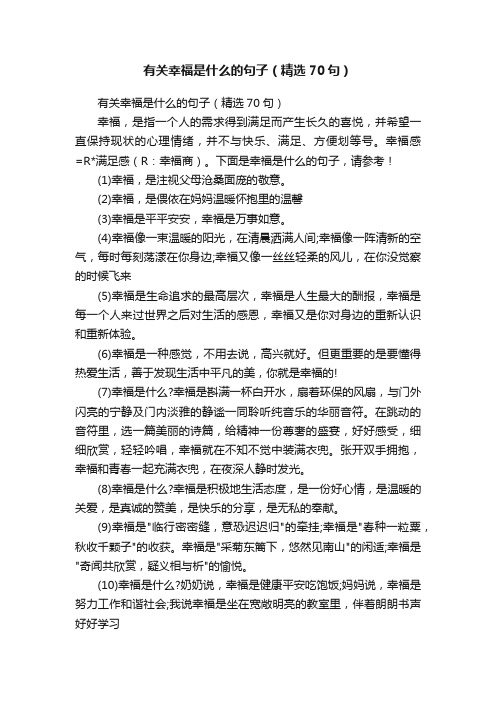
有关幸福是什么的句子(精选70句)有关幸福是什么的句子(精选70句)幸福,是指一个人的需求得到满足而产生长久的喜悦,并希望一直保持现状的心理情绪,并不与快乐、满足、方便划等号。
幸福感=R*满足感(R:幸福商)。
下面是幸福是什么的句子,请参考!(1)幸福,是注视父母沧桑面庞的敬意。
(2)幸福,是偎依在妈妈温暖怀抱里的温馨(3)幸福是平平安安,幸福是万事如意。
(4)幸福像一束温暖的阳光,在清晨洒满人间;幸福像一阵清新的空气,每时每刻荡漾在你身边;幸福又像一丝丝轻柔的风儿,在你没觉察的时候飞来(5)幸福是生命追求的最高层次,幸福是人生最大的酬报,幸福是每一个人来过世界之后对生活的感恩,幸福又是你对身边的重新认识和重新体验。
(6)幸福是一种感觉,不用去说,高兴就好。
但更重要的是要懂得热爱生活,善于发现生活中平凡的美,你就是幸福的!(7)幸福是什么?幸福是斟满一杯白开水,扇着环保的风扇,与门外闪亮的宁静及门内淡雅的静谧一同聆听纯音乐的华丽音符。
在跳动的音符里,选一篇美丽的诗篇,给精神一份尊奢的盛宴,好好感受,细细欣赏,轻轻吟唱,幸福就在不知不觉中装满衣兜。
张开双手拥抱,幸福和青春一起充满衣兜,在夜深人静时发光。
(8)幸福是什么?幸福是积极地生活态度,是一份好心情,是温暖的关爱,是真诚的赞美,是快乐的分享,是无私的奉献。
(9)幸福是"临行密密缝,意恐迟迟归"的牵挂;幸福是"春种一粒粟,秋收千颗子"的收获。
幸福是"采菊东篱下,悠然见南山"的闲适;幸福是"奇闻共欣赏,疑义相与析"的愉悦。
(10)幸福是什么?奶奶说,幸福是健康平安吃饱饭;妈妈说,幸福是努力工作和谐社会;我说幸福是坐在宽敞明亮的教室里,伴着朗朗书声好好学习(11)幸福就是善于发现生活的美,抓住每一个感动的瞬间(12)幸福是什么?幸福有时是一种拥有,有时是一种等待,有时是一种感动。
什么是幸福满分作文600字

什么是幸福满分作文600字幸福,是一种很微妙的东西,有的人倾其一生,也未能找到,而有的人却时时刻刻都能感觉到幸福的存在。
雕塑家罗丹说“世界上不缺少,而是缺少发现美的眼睛。
”以下是小编为大家整理的什么是幸福满分作文600字,希望能给各位提供帮助,欢迎浏览阅读!什么是幸福满分作文600字1最近总是做些奇怪的梦,我不是什么有太多正义感的人,可是朦胧的梦里总是在扮演英雄的角色,让我云里雾里,不明所以。
不过英雄注定是悲剧的,幸好梦注定只是梦,做英雄很累的吧,姑且这样认为吧!所以还是现实的告诉自己,梦里的一切是飘渺的,我这一辈子可能皮毛的关系都没有的吧,平凡又何尝不是一种幸福呢?朴实无华是幸福的吧,如陶渊明种豆南山下,尽管草盛豆苗稀,也乐得其所,我想幸福的感觉来源于内心吧,心是暖的,就算再冷也觉得舒坦,所以一旦拥有,就希望把幸福的滋味一直延续,延续......幸福归根结底是平淡吧,经历了太多的悲欢离合,我们又何尝不想拥有一份恒定的温度,让心一直觉得有所依靠,仅是冰山火海,极寒至冷,也会无所畏惧。
我想在华丽的辞藻也修饰不出幸福的滋味的吧!幸福是很简单的吧,孤独的人感觉不到是由于太少了关注身边的人吧,倘若不用心,何谈幸福呢?古人云:既来之,则安之。
不是没有道理的吧,当离开熟悉的人熟悉的土地,新鲜的气息总是能关注魔力似的勾住异乡人的思绪。
只是那一点点的好奇心所维持的时间转瞬即逝,思念会油然而生吧,对亲人,朋友,兄弟,甚至曾经吵得不可开交的对头,丝丝的幸福感伴随着不可名状的思念慢慢的累积,然后升华。
不知道一个孤独的人是多么的渴望幸福,所以拥有幸福的每一个人都是幸运的吧,这个词或许不恰当,但是,如果因为你的不用心而失去了,那只能是不幸。
不管你是谁,请你用心的滋润来之不易的幸福,因为可贵,所以更需要用心的投入,然后让幸福扩大,在扩大,感染身边的每一个迷茫的人。
平平淡淡的语言,朴朴实实的词汇,幸福和用心因为平淡朴实连在一起,用心滋润幸福,很简单,平衡付出和收获,世界很大,但是幸福的定义很简单,太复杂了,会玷污幸福的,不要在幸福上划上道道伤口,把握住每一次感动,小小的感动是幸福的缩影吧,不需要太多的表达,心与心紧紧靠着,下一个就是你,狠狠的幸福。
什么是幸福作文
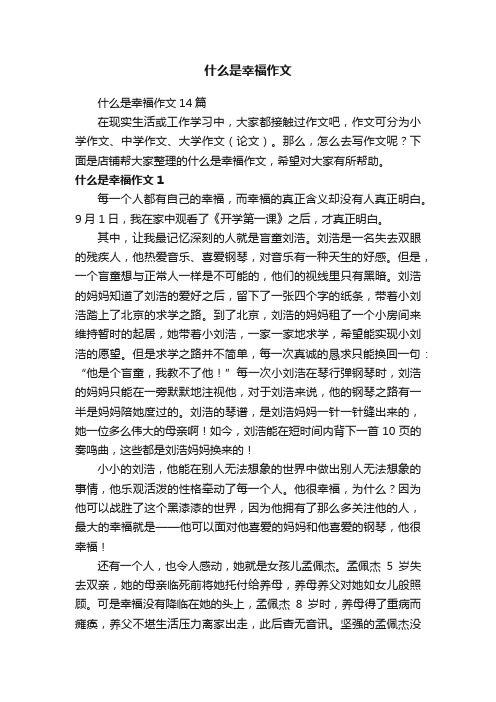
什么是幸福作文什么是幸福作文14篇在现实生活或工作学习中,大家都接触过作文吧,作文可分为小学作文、中学作文、大学作文(论文)。
那么,怎么去写作文呢?下面是店铺帮大家整理的什么是幸福作文,希望对大家有所帮助。
什么是幸福作文1每一个人都有自己的幸福,而幸福的真正含义却没有人真正明白。
9月1日,我在家中观看了《开学第一课》之后,才真正明白。
其中,让我最记忆深刻的人就是盲童刘浩。
刘浩是一名失去双眼的残疾人,他热爱音乐、喜爱钢琴,对音乐有一种天生的好感。
但是,一个盲童想与正常人一样是不可能的,他们的视线里只有黑暗。
刘浩的妈妈知道了刘浩的爱好之后,留下了一张四个字的纸条,带着小刘浩踏上了北京的求学之路。
到了北京,刘浩的妈妈租了一个小房间来维持暂时的起居,她带着小刘浩,一家一家地求学,希望能实现小刘浩的愿望。
但是求学之路并不简单,每一次真诚的恳求只能换回一句:“他是个盲童,我教不了他!”每一次小刘浩在琴行弹钢琴时,刘浩的妈妈只能在一旁默默地注视他,对于刘浩来说,他的钢琴之路有一半是妈妈陪她度过的。
刘浩的琴谱,是刘浩妈妈一针一针缝出来的,她一位多么伟大的母亲啊!如今,刘浩能在短时间内背下一首10页的奏鸣曲,这些都是刘浩妈妈换来的!小小的刘浩,他能在别人无法想象的世界中做出别人无法想象的事情,他乐观活泼的性格牵动了每一个人。
他很幸福,为什么?因为他可以战胜了这个黑漆漆的世界,因为他拥有了那么多关注他的人,最大的幸福就是——他可以面对他喜爱的妈妈和他喜爱的钢琴,他很幸福!还有一个人,也令人感动,她就是女孩儿孟佩杰。
孟佩杰5岁失去双亲,她的母亲临死前将她托付给养母,养母养父对她如女儿般照顾。
可是幸福没有降临在她的头上,孟佩杰8岁时,养母得了重病而瘫痪,养父不堪生活压力离家出走,此后杳无音讯。
坚强的孟佩杰没有因此放弃,她小小的身躯担起了这个家的责任,她一边学习一边照顾瘫痪的母亲,任劳任怨,不离不弃。
在她经历了4000多个日子后,2009年的一天,她意外地被距离家乡百公里外的山西师范大学临汾学院录取,不放心养母的她决定“带着母亲上大学”,她在学校附近租了房子,继续悉心照料着养母。
什么是幸福作文
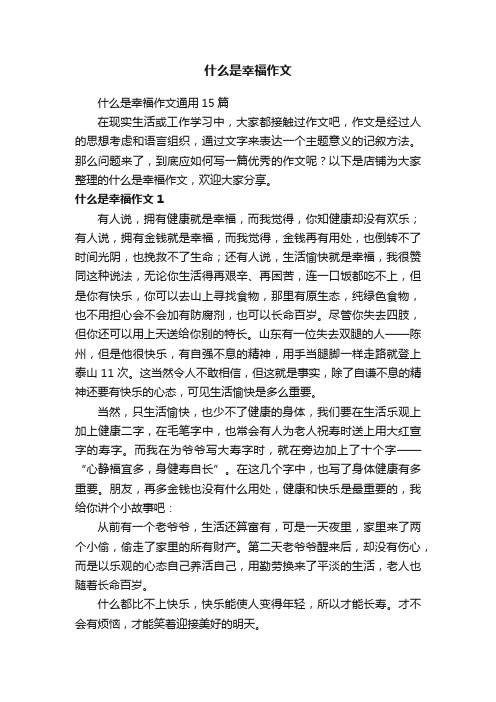
什么是幸福作文什么是幸福作文通用15篇在现实生活或工作学习中,大家都接触过作文吧,作文是经过人的思想考虑和语言组织,通过文字来表达一个主题意义的记叙方法。
那么问题来了,到底应如何写一篇优秀的作文呢?以下是店铺为大家整理的什么是幸福作文,欢迎大家分享。
什么是幸福作文1有人说,拥有健康就是幸福,而我觉得,你知健康却没有欢乐;有人说,拥有金钱就是幸福,而我觉得,金钱再有用处,也倒转不了时间光阴,也挽救不了生命;还有人说,生活愉快就是幸福,我很赞同这种说法,无论你生活得再艰辛、再困苦,连一口饭都吃不上,但是你有快乐,你可以去山上寻找食物,那里有原生态,纯绿色食物,也不用担心会不会加有防腐剂,也可以长命百岁。
尽管你失去四肢,但你还可以用上天送给你别的特长。
山东有一位失去双腿的人——陈州,但是他很快乐,有自强不息的精神,用手当腿脚一样走路就登上泰山11次。
这当然令人不敢相信,但这就是事实,除了自谦不息的精神还要有快乐的心态,可见生活愉快是多么重要。
当然,只生活愉快,也少不了健康的身体,我们要在生活乐观上加上健康二字,在毛笔字中,也常会有人为老人祝寿时送上用大红宣字的寿字。
而我在为爷爷写大寿字时,就在旁边加上了十个字——“心静福宜多,身健寿自长”。
在这几个字中,也写了身体健康有多重要。
朋友,再多金钱也没有什么用处,健康和快乐是最重要的,我给你讲个小故事吧:从前有一个老爷爷,生活还算富有,可是一天夜里,家里来了两个小偷,偷走了家里的所有财产。
第二天老爷爷醒来后,却没有伤心,而是以乐观的心态自己养活自己,用勤劳换来了平淡的生活,老人也随着长命百岁。
什么都比不上快乐,快乐能使人变得年轻,所以才能长寿。
才不会有烦恼,才能笑着迎接美好的明天。
什么是幸福作文2记得看过一句话,说:幸福就是,猫吃鱼,狗吃肉,奥特曼打小怪兽。
每个人对幸福有着自己的理解,但我对幸福有着另一翻理解(她对幸福的理解最大的感受就是快乐,于是我告诉她,这个理解并不是很另类,于是就改成--而我对幸福有着这样的理解)。
- 1、下载文档前请自行甄别文档内容的完整性,平台不提供额外的编辑、内容补充、找答案等附加服务。
- 2、"仅部分预览"的文档,不可在线预览部分如存在完整性等问题,可反馈申请退款(可完整预览的文档不适用该条件!)。
- 3、如文档侵犯您的权益,请联系客服反馈,我们会尽快为您处理(人工客服工作时间:9:00-18:30)。
什么是幸福
"Are you happy?" I asked my brother, Ian, one day.
"Yes. No. It depends on what you mean," he said.
"Then tell me," I said, "when was the last time you think you were happy?" "April 1967," he said.
It served me right for putting a serious question to someone who has joked his way through life. But Ian's answer reminded me that when we think about happiness, we usually think of something extraordinary, a pinnacle of sheer delight. And those pinnacles seem to get rarer the older we get.
For a child, happiness has a magical quality. I remember making hide-outs in newly cut hay, playing cops and robbers in the woods, getting a speaking part in the school play. Of course, kids also experience lows, but their delight at such peaks of pleasure as winning a race or getting a new bike is unreserved.
In the teenage years, the concept of happiness changes. Suddenly it's conditional on such things as excitement, love, popularity and whether that zit will clear up before a prom night. I can still feel the agony of not being invited to a party that almost everyone else was going to. But I also recall the ecstasy of being plucked from obscurity at another event to dance with a John Travolta look-alike.
In adulthood the things that bring profound joy - birth, love, marriage - also bring responsibility and the risk of loss. Love may not last, loved ones die. For adults, happiness is complicated.
My dictionary defines happy as "lucky" or "fortunate", but I think a better definition of happiness is "the capacity for enjoyment". The more we can enjoy what we have, the happier we are. It's easy to overlook the pleasure we get from loving and being loved, the company of friends, the freedom to live where we please, even good health.
I added up my little moments of pleasure yesterday. First there was sheer bliss when I shut the last lunchbox and had the house to myself. Then I spent an uninterrupted morning writing, which I love. When the kids came home, I enjoyed their noise after the quiet of the day.
You never know where happiness will turn up next. When I asked friends what makes them happy, some mentioned seemingly insignificant moments. "I hate shopping," one friend said. "But there's this clerk who always chats and really cheers me up."
Another friend loves the telephone. "Every time it rings, I know someone is thinking about me."
We all experience moments like these. Too few of us register them as happiness.
While happiness may be more complex for us, the solution is the same as ever. Happiness isn't about what happens to us; it's about how we perceive what happens to us. It's the knack of finding a positive for every negative, and viewing a set-back as a challenge. It's not wishing for what we don't have, but enjoying what we do possess.
“你幸福吗?”一天我问我的兄弟伊恩。
“又幸福,又不幸福。
这要看你指的是什么,”他说。
“那么告诉我,”我说,“你最近一次感到幸福是什么时候?”
“1967年4月,”他说。
向一个游戏人生的人提问这么严肃的问题,我真是自讨苦吃。
但是伊恩的话启发了我,当我们考虑幸福的时候,我们通常想到一些不同寻常的事情和愉快无比的时刻,而随着年龄的增长,这种时刻是越来越少。
对于孩子来说,幸福充满了魔力。
我记得在新割下的草堆里捉迷藏,在树林里扮演警察和强盗,在校剧中担当有台词的角色。
当然孩子也有情绪低落的时候,但是当赢了赛跑或得到一辆新自行车时,他们流露出快乐是无可比拟、没有任何保留的。
到了少年时期,幸福观发生了变化。
突然间幸福有了条件,例如:刺激、爱情、名气以及舞会前青春痘是否能消除等。
我还能感受到因未被邀请去参加一个几乎人人有份的晚会所体会到的痛苦;我还记得在另一次活动中因与一位酷似约翰·屈沃塔的人跳舞而大出风头的那份激动心情。
成年时,能带来深深欢乐的事情(如出生、爱情和婚姻),同时也带来了责任和失去的危险。
爱情也许难以持久;心爱的人也许会离开人世。
对于成年人来说,幸福是复杂的。
我的字典把幸福定义为“幸运”或“好运”。
但是我想幸福更好的定义是“享受的能力”。
我们越能享受所拥有的一切,我们就越幸福。
从爱与被爱、友情、随心所欲择地而居、甚至到拥有的健康,其中获得的快乐很容易被我们忽视了。
我总结了一下我昨天的幸福时刻:首先是我合上最后一个午餐饭盒,独自在家时的那种无比幸福;然后过了一个写作不受干扰的上午,令我愉快;等到孩子们回家,我享受安静的一天过后他们吵闹的声音。
你永远无法知道下一次幸福何时来临。
我问朋友们什么能使他们感到幸福,一些人举出一些似乎不太重要的时刻。
“我不喜欢购物,”一位朋友说,“但那里有一个爱聊天的售货员,让我感到很愉快。
”
另一位朋友喜欢接电话。
“每次电话铃声响,我就知道有人正想着我呢。
”
我们都经历过类似的事,但视之为幸福的人寥寥无几。
虽然幸福对我们来说也许更错综复杂,但是获得幸福的途径永远是一样的。
幸福不在于我们的遭遇如何,而在于我们如何看待所遭遇到的事情。
这是化消极为积极、将挫折看作挑战的诀窍。
幸福不是凭空许愿,而是享受拥有。
